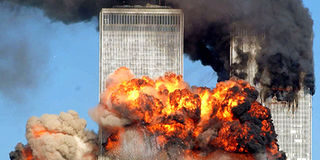Breaking News: At least 10 feared to have drowned in Makueni river
Day that changed the world

On September 9, 2001 at 8.46 a.m., Mohammed Atta, the 33-year-old hijacker of American Airlines flight number AA11, sharply banked the plane to the right and smashed a hole through one of New York’s tallest buildings
On the morning of September 11, 2001 Kaaria W Mbaya was at his desk on the 105th floor of the World Trade Centre.
A soft-spoken computer analyst, he loved his job because of its informality – he hated dressing up and the IT world was just perfect for him.
Kaaria regularly got to his office at the giant financial services firm Cantor Fitzgerald early because he lived a short walking distance from the Twin Towers.
That morning was shaping up to be just another unremarkable day at work. Then at 8.46 a.m., Mohammed Atta, the 33-year-old hijacker of American Airlines flight number AA11, sharply banked the plane to the right and smashed a hole through one of New York’s tallest buildings.
The impact was made just seven floors below Kaaria’s office, which was nearly 400 metres off the ground. As the world watched in horror, some of those at the offices of Cantor Fitzgerald opted to jump to their deaths (see separate story above).
Others were trapped inside and suffocated due to the flames and smoke. Those closest to the point of impact were vapourised. It is not clear how Kaaria died.
But history records that he was one of the nearly 3,000 victims from across the world that perished on the day the world was introduced to Osama bin Laden’s war on America.
It is 10 years today since al Qaeda altered the course of history with the attack on American soil that brought down the Twin Towers and left the headquarters of the world’s most powerful military in flames.
A decade on, the impact of that event endures. A grocer in the slums of Nairobi has to pay a much steeper price for kerosene than he did 10 years ago today, in part due to the wars in the Middle East that followed in the attack’s wake.
A girl child in Somalia has a lower chance of going to school in regions controlled by the al Qaeda-inspired militants al Shabaab who have grown in prominence in the last five years.
In other nations from Uganda to Afghanistan to Iraq, thousands of lives have been lost in the complicated aftermath of 9/11.
In this edition we examine the legacy of the horrific events of September 11, 2001 and their effect on the lives of many across the world. We assess the high cost of the failure of US authorities to react to the atrocities in Nairobi and Dar es Salaam in 1998 when al Qaeda’s path to war was charted.
September 11, 2001 was above all a human tragedy. Thousands lost mothers, fathers, daughters, sons, friends.
One of those at commemorations today will be Kaaria’s mother, University of Nairobi biochemistry professor Vertestine Mbaya. In a 2001 New York Times profile of her son, the only Kenyan who died in the attacks, Prof Mbaya remembered Kaaria as an exceedingly gentle soul.
Today, Prof Mbaya will be among thousands of other families across the world paying their respects to the many victims of a war whose battles are yet to be settled.




